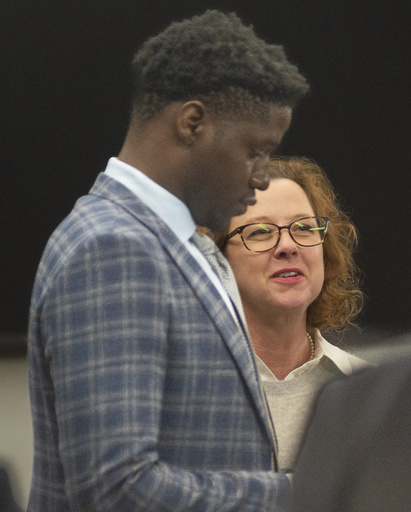Johnson, who was the District Attorney at the time of Arbery’s death nearly five years ago, has consistently refuted allegations that she influenced law enforcement actions, which initially resulted in no arrests in the case. The judge’s decision effectively put an end to the criminal charges that had been pending against Johnson for over three years.
At the outset of her trial last week, Johnson was facing serious accusations, including a felony charge for violating her oath of office and a misdemeanor charge for obstructing justice. The trial concluded in her favor after the judge dismissed the case without allowing the jury to render a verdict, despite five days of testimony, which included Johnson’s own statements.
Senior Judge John R. Turner dismissed the felony charge after Johnson’s legal team presented arguments that pointed out critical flaws in the 2021 indictment. They asserted that it lacked sufficient legal grounding and failed to convincingly allege any criminal conduct on Johnson’s part.
“This is not a decision I wanted to make,” Turner expressed in the courtroom; nonetheless, he acknowledged that the defense had successfully challenged the indictment’s validity.
Earlier in the week, the judge had also acquitted Johnson of the misdemeanor obstruction charge after reviewing the prosecution’s case and finding a lack of evidence supporting the claim that she had directed police not to arrest Travis McMichael, the man who shot Arbery.
Parents of Ahmaud Arbery expressed their dismay at the conclusion of Johnson’s trial, maintaining that she attempted to protect Arbery’s killers. Marcus Arbery Sr. described the judge’s ruling as a “devastating” blow, while Wanda Cooper-Jones expressed her belief that the jury would have found Johnson guilty had they the opportunity.
On February 23, 2020, Travis and Greg McMichael pursued Arbery while armed and operating a pickup truck after observing him running in their community near Brunswick. They were later joined by a neighbor, William “Roddie” Bryan, who filmed the moment Travis McMichael shot Arbery point-blank with a shotgun. It took over two months for arrests to be made, following the circulation of the video, which led the Georgia Bureau of Investigation to take control of the case. The McMichaels and Bryan ultimately faced charges of murder and federal hate crimes in separate legal proceedings.
Georgia Attorney Chris Carr initiated an inquiry into Johnson’s conduct, culminating in her indictment in 2021. The prosecution alleged that Johnson had withheld pertinent information related to the case, including advice from another prosecutor, which indicated that Arbery’s shooting could have been justified on the grounds of self-defense.
Greg McMichael had been employed as an investigator under Johnson prior to his retirement the year before the shooting. He reportedly left a voicemail for Johnson asking for assistance following the incident.
On the witness stand, Johnson denied any involvement in preventing arrest, stating she never instructed anyone to assist the McMichaels. Testimony revealed that George Barnhill, the first appointed prosecutor to handle Arbery’s case, had independently concluded the shooting was justified without any input from Johnson.
Brian Steel, representing Johnson, contended that his client was wrongfully indicted amidst a broader narrative surrounding systemic racism. He remarked, “Jackie was portrayed as someone who endorsed racism. That characterization is entirely unfounded.”
Following the controversy surrounding Arbery’s death, Johnson lost her re-election bid in November 2020 and attributed her defeat largely to the fallout from the case. After the trial concluded, she left the courthouse without addressing reporters.
Prosecutors struggled throughout the trial as their testimonies failed to paint Johnson’s actions with legal wrongdoing. Their witnesses, who were meant to discuss conflict of interest protocols for district attorneys, indicated that they observed no illegal behavior from Johnson. The indictment claimed that she had inappropriately influenced police in the arrest of Travis McMichael. However, Officer Stephanie Oliver testified that Johnson did not intervene in any such manner, and there was no testimony presented from the second officer involved.
Following the trial’s conclusion, Carr reiterated that his office endeavored to pursue justice effectively. He stated, “We stand by the case we presented, and we regret that the jury was not able to reach a decision.”
Last week, Johnson’s defense team requested the indictment’s dismissal from the judge. Although Turner deferred his ruling until Wednesday morning, he did not provide clarity on his rationale. Johnson’s attorneys emphasized that the oath violation cited in the indictment referenced an expired oath from 2010, whereas they contended she had taken a new oath following her 2016 re-election.
Furthermore, her defense claimed that the indictment accused her of conduct that did not constitute a breach of duty, alleging that she had exhibited favoritism towards Greg McMichael and had not treated Arbery’s family with fairness. “It simply did not articulate a crime,” Steel observed, emphasizing that Johnson’s interactions with the attorney general about the case were lawful actions.
